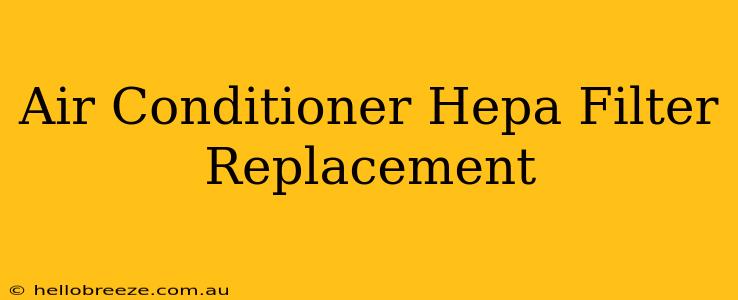Maintaining a clean and healthy indoor environment is crucial, especially during those sweltering summer months when your air conditioner works overtime. A key component in achieving this is ensuring your AC unit's HEPA filter is clean and regularly replaced. This guide will walk you through the importance of HEPA filter replacement in your air conditioner, how often you should replace it, and the simple steps involved in the process.
Why is HEPA Filter Replacement Important?
HEPA (High-Efficiency Particulate Air) filters are the unsung heroes of clean air. Unlike standard air filters, HEPA filters are designed to capture 99.97% of airborne particles with a size of 0.3 microns or larger. This includes a wide range of pollutants, such as:
- Dust mites: Tiny creatures that trigger allergies and asthma.
- Pollen: A major culprit in seasonal allergies.
- Pet dander: A common allergen for pet owners.
- Mold spores: Can cause respiratory problems.
- Bacteria and viruses: Helps reduce the spread of airborne illnesses.
- Smoke and soot: Removes pollutants from wildfire smoke or industrial emissions.
Neglecting HEPA filter replacement allows these particles to circulate freely within your home, potentially impacting your respiratory health and overall comfort. A clogged filter also reduces your AC unit's efficiency, forcing it to work harder and potentially leading to higher energy bills and premature wear and tear.
How Often Should You Replace Your Air Conditioner HEPA Filter?
The frequency of HEPA filter replacement depends on several factors, including:
- Air quality: In areas with high levels of pollution or allergens, more frequent replacements are necessary.
- Pet ownership: Pets shed dander, requiring more regular filter changes.
- Usage: The more you use your air conditioner, the faster the filter will become clogged.
A good rule of thumb is to check your filter every 30-60 days. If it appears visibly dirty, clogged, or restricted with dust, it's time for a replacement. Consult your air conditioner's manual for specific recommendations.
Step-by-Step Guide to Air Conditioner HEPA Filter Replacement
The process of replacing your air conditioner's HEPA filter is typically straightforward, but the exact steps may vary slightly depending on your AC unit's make and model. Always consult your owner's manual for detailed instructions specific to your model. Generally, the process involves:
1. Locate the Filter
Your air conditioner's HEPA filter is usually located behind a panel or grille on the unit itself. The location will vary, so refer to your manual.
2. Turn Off the Power
Before you begin, always turn off the power to your air conditioner at the breaker box to prevent accidental electric shock.
3. Remove the Old Filter
Carefully remove the old filter by following the instructions in your manual. Some filters simply slide out, while others may require unscrewing or unclipping.
4. Inspect the Filter Compartment
Once the old filter is out, take a moment to inspect the filter compartment for any accumulated debris. Clean it gently with a vacuum cleaner or brush.
5. Install the New Filter
Insert the new HEPA filter, ensuring it's properly seated and aligned according to the instructions in your manual.
6. Restore Power and Test
Once the new filter is installed, turn the power back on to your air conditioner and check that it's operating correctly.
Choosing the Right HEPA Filter
When purchasing a replacement HEPA filter, ensure you select the correct size and model compatible with your specific air conditioner. Using the incorrect filter can impair performance and may even damage your unit. Check your air conditioner's manual or the old filter for model numbers and specifications.
Investing in regular HEPA filter replacement is an investment in your health and the longevity of your air conditioner. By following these simple steps and keeping your filter clean, you can enjoy cleaner, healthier air and a more efficient, longer-lasting air conditioning system. Remember to always refer to your air conditioner's manual for specific instructions.

